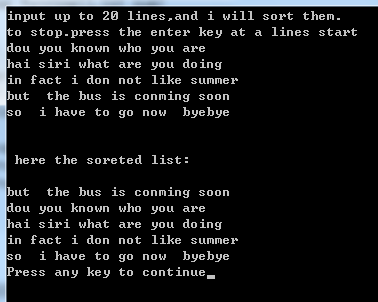1、实例程序:string.c的程序:
|
1
2
3
4
5
6
7
8
9
10
11
12
13
14
15
16
17
18
19
20
21
22
23
24
25
26
27
28
|
#include<stdio.h>#define MSG "YOU MUST have many talents .tell me some."#define LIM 5#define LINELEN 81int main(){char name[LINELEN];char talents[LINELEN];int i;const char m1[40]="limit yourself to one line's worth.";const char m2[]="IF you can't think of your anything,fake it.";const char*m3="
ENough about me,what's your name?";const char *mytal[LIM]={"adding numbers swiftly","mulityplying accurately","stashing data","flowing instructions to the letter","understanding C language"};//初始化一个字符串指针数组printf("hi , i'm clyde the computer." "i have many talents.
");printf("let me tell you some talents.
");puts("what were they?");for (i=0;i<LIM;i++)puts(mytal[i]);puts(m3);gets(name);printf("well, %s,%s
",name,MSG);printf("%s
%s
",m1,m2);gets(talents);puts("let me see if i have got that list:");puts(talents);printf("thanks for the information .%s.
",name);return 0;} |
运行结果:
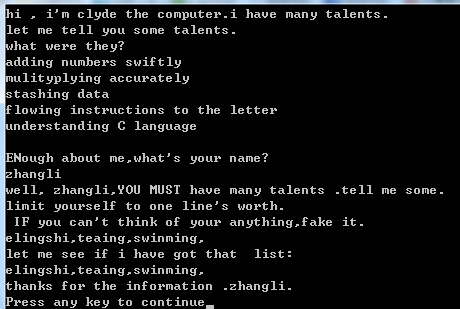
从中可以看出:定义字符串的方法有:使用字符串常量、char 数组、char指针、字符串数组、
2、把字符串看做指针:
实例程序:
|
1
2
3
4
5
6
|
#include<stdio.h>int main(){printf("%s,%p,%c
","we","are",*"spare farers");return 0;} |
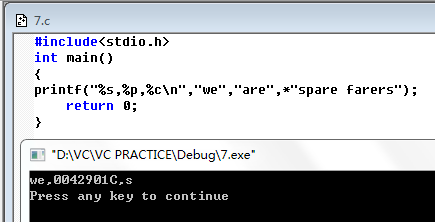
%s 格式输出字符串“we”,%p格式产生一个十六进制的地址,因此如果“are”是个地址,那么%p应该输出字符串中第一个字符的地址。最后
|
1
|
*"spare farers"应该产生所指向的地址中的值,即字符串*"spare farers"的第一个字符。 |
3、strlen() 得到字符串的长度,缩短字符串函数
示例程序:
|
1
2
3
4
5
6
7
8
9
10
11
12
13
14
15
16
17
18
|
#include<stdio.h>#include<string.h>void fit(char *,unsigned int);int main(void){char mesg[]="Hold on to your heads,hackers.";puts(mesg);fit(mesg,7);puts(mesg);puts("let's look at some more of the string.");puts(mesg+8);return 0;}void fit (char *string,unsigned int size){if(strlen(string)>size)*(string+size)='�';} |
运行结果:
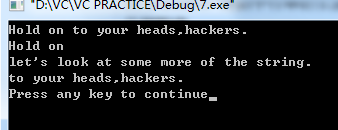
fit()函数在数组的第8个元素中放置了一个
|
1
|
'�',代替原有的空格字符,put函数输出时停在了第一个空格符处。忽略数组的其他元素,然而数组的其他元素仍然存在,mesg+8表示mesg[8]即‘t'字符的地址,因此puts函数继续输出,直到遇到原字符串中的空字符。 |
4、strcat()代表(string concatenation)函数.函数接受两个字符串参数,它将第二个字符串的一份拷贝添加到第一个字符串的串尾,从而使第一个字符串称为一个新组合的字符串,第二个字符串并没有改变。该函数是char* 类型(指向char的指针),这个函数返回它的第一个参数的值,即其后添加了第二个字符串的那个字符串第一个字符的地址。板面的做法和配料
实例程序:
|
1
2
3
4
5
6
7
8
9
10
11
12
13
14
|
#include<stdio.h>#include<string.h>#define size 80int main(){ char flower[size];char addon[]="s smell like old shoes,";puts("what's your favorite flowes?");gets(flower);strcat(flower,addon);puts(flower);puts(addon);return 0;} |
运行结果:
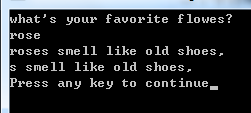
5、strncat()函数,strcat函数并不检查第一个数组是否能够容纳的下第二个字符串。如果没有给第一个数组分配足够的空间,多出来的字符溢出到相邻的存储单元时就会出问题。此时用strncat()函数。这个函数需要另外的一个参数来指明最多允许添加的字符的数目,例如strncat(bugs,addon,13),函数把addon中的内容添加到bugs上,直到加到13个字符或者遇到空字符为止。
6、strcmp()函数。用户的响应和一个已有的字符串进行比较。代表(string comarison)strcmp(a,b),如果两个字符串的参数相同,则返回值为0.比较的是字符串,而不是数组。用于比较字符串而不是字符。
等等。
7、一个字符串排序的例子
我们来看一个把字符串按照字母表进行排序的例子。主要用到strcmp()
示例程序:
|
1
2
3
4
5
6
7
8
9
10
11
12
13
14
15
16
17
18
19
20
21
22
23
24
25
26
27
28
29
30
31
32
33
34
35
36
37
|
#include<stdio.h>#include<string.h>#define size 81#define lim 20#define halt " "//用空字符终止输入void start(char *string[],int num);//字符串排序函数int main(){char input[lim][size];char *ptstr[lim];int ct=0;int k;printf("input up to %d lines,and i will sort them.
",lim);printf("to stop.press the enter key at a lines start
");while (ct<lim&& gets(input[ct])!=NULL&&input[ct][0]!='�'){ptstr[ct]=input[ct];ct++;}start(ptstr,ct);puts("
here the soreted list:
");for(k=0;k<ct;k++)puts(ptstr[k]);return 0;}void start(char *string[],int num){char *temp;int top,seek;for (top=0;top<num-1;top++)for(seek=top+1;seek<num;seek++)if(strcmp(string[top],string[seek])>0){temp=string[top];string[top]=string[seek];string[seek]=temp;}} |
运行结果:
